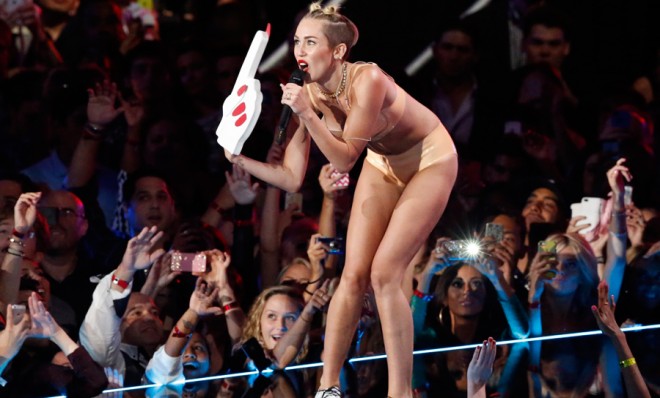8 smart people searching for lessons in Miley Cyrus' twerking
Critics can't accept that she's just being Miley


By now, you've likely heard about Miley Cyrus' fantastically awful MTV Video Music Awards performance. The former Disney star's sloppily sexual rendition of her own song, "We Can't Stop," and Robin Thicke's "Blurred Lines" at the VMAs has been called everything from "raunchy" to "disgusting sexual exploitation." But while commenting on a former child star's antics may seem low-brow, critics everywhere have been waxing philosophical about Miley's twerkstravaganza (especially in regards to race).
So what does Miley's gyrating say about racial inequality, sexism, pop culture, child stars, hip-hop, and Janis Joplin? Here are the answers:
1. Jody Rosen, New York: "The 2013 VMAs were dominated by Miley's minstrel show"
The Week
Escape your echo chamber. Get the facts behind the news, plus analysis from multiple perspectives.

Sign up for The Week's Free Newsletters
From our morning news briefing to a weekly Good News Newsletter, get the best of The Week delivered directly to your inbox.
From our morning news briefing to a weekly Good News Newsletter, get the best of The Week delivered directly to your inbox.
The argument: "Cyrus' twerk act gives minstrelsy a postmodern careerist spin. Cyrus is annexing working-class black 'ratchet' culture, the potent sexual symbolism of black female bodies, to the cause of her reinvention: her transformation from squeaky-clean Disney-pop poster girl to grown-up hipster-provocateur."
2. Rich Juzwiak, Gawker: "In defense of Miley Cyrus"
The argument: "Like Nicki Minaj, who twists up her face routinely because she's so striking that she can afford to do so, Cyrus was not afraid to look ugly on that VMAs stage. Though obviously choreographed, she exhibited a sort of hideous spontaneity that's you don't see as much in these safe, media-trained times watched over by St. Beyoncé. The carelessly tossed limbs and awkward fumbling stances reminded me of youthful experimentations with sex. Cyrus' performance was a pop rendering of clanking teeth, an elbow to the face, bodies that never quite find the right rhythm. In fact, it reminded me of the awkward, iconic mess Madonna made when she just kind of flopped down and started rolling on the ground during her 'Like a Virgin' VMAs performance, 29 years ago."
3. Tressie McMillian Cottom, Slate: "Miley Cyrus' VMA performance and the white appropriation of black bodies"
A free daily email with the biggest news stories of the day – and the best features from TheWeek.com
The argument: "Cyrus did not just have black women gyrating behind her. She had particularly rotund black women. She gleefully slaps the ass of one dancer like she intends to eat it on a cracker. She is playing a type of black female body as a joke to challenge her audience's perceptions of herself, while leaving their perceptions of black women's bodies firmly intact. It's a dance between performing sexual freedom and maintaining a hierarchy of female bodies from which white women benefit materially."
4. Kevin Fallon, The Daily Beast: "Miley Cyrus' VMA performance was ridiculous, but it wasn't racist"
The argument: "Sometimes a VMA performance is just a VMA performance. We may be a nation clutching our pearls, collectively raising one eyebrow, and asking in hushed whispers over our cubicle walls, 'Did you see Miley last night?' but all that means is that we got exactly what we wanted from the VMAs. We want unpredictability. We want provocation. We want Miley Cyrus to stick her face into a large woman's butt crack because we want to be talking about it the next morning."
5. Noah Berlatsky, The Atlantic: "If Miley Cyrus' twerking is racist, isn't Janis Joplin's singing also racist?"
The argument: "Joplin didn't use black dancers that I'm aware of, and she didn't use black woman, or black women's bodies, as a code for sex, as Cyrus does. But there are still uncomfortable parallels. Joplin, like Cyrus, deliberately referenced and used a style associated with black women — not twerking, for Joplin, but the female blues singing tradition associated with Bessie Smith. And Joplin, like Cyrus, used that association, and the stereotypes linked to it, to shape her own image against a traditional white femininity. Cyrus uses blackness to be sexual; Joplin used blackness to show she was earthy and real. "
6. Tom Hawking, Flavorwire: "In defense of Miley Cyrus' VMA performance"
The argument: "Honestly, if anything's racist, it's continuing to cast hip-hop as exclusively 'black' music, which is really only a device to cast it as an Other, as ghetto culture that's separate from the white mainstream, when in reality it is the mainstream and has been so for decades… Sure, there's nothing remotely 'authentic' about her performance. But the spectacle of Miley twerking isn't any more or less authentic than, say, Drake's 'Started From the Bottom,' which was also performed at the same ceremony — unless, of course, you consider 'the bottom' to be growing up in a nice Toronto neighborhood and being on Degrassi."
7. Nolan Feeney, The Atlantic: "Was Miley Cyrus' VMA performance a failed 'Blurred Lines' criticism?"
The argument: "Was Cyrus's and Thicke's performance actually a thought-out response to 'Blurred Lines' criticism? Even before the song hit No. 1, 'Blurred Lines' and its oft-parodied video have been accused of treating women like objects and promoting rape culture with its 'I know you want it' hook, physical aggression, and subtle messages about alcohol and consent. Cyrus's performance with Thicke played with several of these themes in a way that could be read as commentary — though, at best, failed commentary."
8. Demetria L. Lucas, The Root: "Miley Cyrus is acting a fool, not 'acting black'"
The argument: "Call Cyrus' MTV spectacle — and all of her desperate cries for attention — lewd. Call it trashy. And vulgar. But whatever you do, do not call this mess that Cyrus is doing 'black.'"
Samantha Rollins is TheWeek.com's news editor. She has previously worked for The New York Times and TIME and is a graduate of Northwestern University's Medill School of Journalism.
-
 ‘Ghost students’ are stealing millions in student aid
‘Ghost students’ are stealing millions in student aidIn the Spotlight AI has enabled the scam to spread into community colleges around the country
-
 A running list of everything Donald Trump’s administration, including the president, has said about his health
A running list of everything Donald Trump’s administration, including the president, has said about his healthIn Depth Some in the White House have claimed Trump has near-superhuman abilities
-
 NASA’s lunar rocket is surrounded by safety concerns
NASA’s lunar rocket is surrounded by safety concernsThe Explainer The agency hopes to launch a new mission to the moon in the coming months
